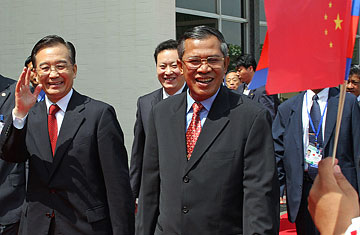
Chinese Prime Minister Wen Jiabao, left, waves next to Cambodian Prime Minister Hun Sen after the two countries signed agreements in Phnom Penh in April 2006
(2 of 2)
"The list of Chinese visitors is so long that the Chinese Embassy's political and economic officers complained to [embassy officials] that they never get any rest," said a cable in 2008, before the Uighur deportations. The upshot was that the Cambodians maintained a "steely pragmatism by which Cambodia balances China with others, including the U.S." but uses China as a "blank check."
A spokesman for the Chinese Embassy, which sits prominently on a Phnom Penh thoroughfare named for Mao Zedong, said the events of 2008, at least, were perhaps misread by the U.S. Embassy. "China is a good neighbor of Cambodia. A lot of aid and a lot of help for a good friend is traditional," said Yang Tian Yue, director of political affairs. "To help the friend does not mean not to give the opportunity for the other friend of Cambodia."
Indeed, to all appearances, U.S. relations with Cambodia have not suffered as a result of the country's growing ties with Beijing. The new U.S. Embassy, a sprawling two-hectare campus completed in 2006, has its own prominent spot in the capital directly opposite Wat Phnom, the hilltop pagoda from which Phnom Penh takes its name. The U.S. has expanded the nations' military ties, multiplied the number of high-level visits and sought Washington lawmakers' approval to devote a growing share of the U.S. aid budget to health, human rights and rule-of-law programs in Cambodia.
At her initial meeting with Prime Minister Hun Sen in January 2009, current U.S. Ambassador Carol Rodley noted, according to a classified cable, the warmth of her reception was a sign of the importance Cambodia placed on its relations with Washington. "Gushingly," the cable said, the premier claimed "he spends more of his time with the American ambassador than with any other members of the diplomatic community."
So far, most of the Cambodian establishment appears to have greeted the disclosures with equanimity. However, Hor Namhong, the foreign minister, on July 14 summoned the embassy's new deputy chief of mission to denounce a classified 2002 cable as "full of unacceptable maligned indictment" because it repeated allegations that the minister had in the 1970s committed crimes at a Khmer Rouge labor camp for "intellectuals" and returnees, at least 16 of whom were exterminated by Pol Pot's secret police. (Hor Nahmong has repeatedly sued over the accusations but flouted a summons in 2009 to testify before a special tribunal investigating the Khmer Rouge regime.)
For the world's small cadre of Cambodia scholars and journalists, the WikiLeaks disclosures offered rare dish. As they had in other countries, American diplomats had privately recorded downright catty descriptions of public figures, describing the foreign minister as "sclerotic" and labeling the businessman Kith Meng, a ranking member of the Khmer oligarchy, as a "ruthless gangster," while saying Beijing's relations with King Father Norodom Sihanouk, the father Cambodian independence, were "more or less the 'property of China' and will revert to the PRC upon Sihanouk's death," just like the residence China's leaders had built for the former King in Beijing.
Virtually all Southeast Asian nations are eager to maintain good relations with both China and the U.S., which serves as an alternative to the growing muscle flexed by Beijing. But, according to Sophie Richardson, an expert on Chinese foreign policy and Asia advocacy director for Human Rights Watch, the U.S. response to China's growing clout here has been uneven. "In some key instances, the U.S. appears to be engaging with China in a race to the bottom, not an effort to uphold real and rhetorical commitments to human rights and political reform," she said. "On other occasions, however, the U.S. has on principle vocally defended key human rights issues in Cambodia that neither Phnom Penh nor Beijing cares much about... Cambodia is just one of several countries in which the U.S.'s apparent uncertainty about how to grapple with rising Chinese influence is playing out."
